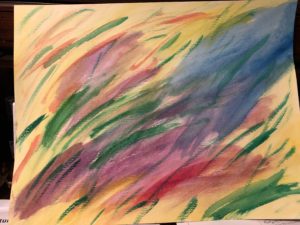Not Every Hour Is Billable—Nor Does It Have To Be

Is it art? No. Was it fun? Yes.
I was having lunch with a friend recently, and she confessed that she was worried because she didn’t have a side hustle generating piles of money for her. She has a Good Job (steady work, a living-plus wage that is fair for the job, and decent benefits), but she felt she should be making more money by working more—specifically, by turning her crafts into an Etsy store, and also running a white label service for other people to sell her crafts. She does amazing things with paper, and, in fact, I had just exclaimed over her latest project, thoughtlessly commenting on how great it would do on Etsy. (Note to self: stop that.)
We talked it through, and she concluded that no, she doesn’t need a side hustle, despite what all the side hustle gurus (Chris Guillebeau, in particular, was the one that had given her serious doubts about relying on her day job alone) assure us that we all need, and must do, no matter what.
The side hustle sages tell us we shouldn’t rely on just one income stream, that having multiple sources of revenue is the only way to achieve financial security in the Gig Economy. But isn’t running a bunch of side hustles instead of / in addition to having a Regular Job just perpetuating the Gig Economy? If you’re spending every minute you’re not at your day job working your side hustle, when do you have fun? When do you do things that bring you pleasure? When do you sleep?
She doesn’t need the money; sure, who doesn’t appreciate extra cash in their bank account? But it would not enable her to quit her day job (unless it became her day job), and it would take a great deal of her free time, which she really needs to decompress from her day job. Instead of being a source of relaxation and creative pleasure, it would become one more area of pressure—to produce, to be perfect, to devote more time and energy, even when she didn’t have much of either. One more obligation, on top of the obligations she already deals with every day.
When I was in college, some friends had a band for a while. They eventually split, unable to agree on why they were playing—two of them wanted fame and fortune, and the third one wanted to play local gigs and have a good time. When I asked him about it, he explained, “Music is my joy. If it becomes my work, what am I going to do for fun? Work in an insurance office?”
I paint. I’m terrible at it—I can’t draw well, so the paintings are a mess, but, to borrow from Winston Churchill, “painting keeps the Black Dog away”. Painting is something that has absolutely no connection to my day job, and isn’t part of my public persona, so there are no expectations. I can paint (badly) all I wish, and the result is a few hours spent peacefully, and my improved mood. No amount of money generated by a side hustle can buy that for me.
I make clay objects for my altars (some of them featured here and here on my blog!). Making them is fun, and is also a form of devotion. Are the objects perfect? No. Could I sell them on Etsy? No. But they don’t have to be perfect, they just have to be good enough for me to feel good about putting them on my altars.
I took a tapestry weaving class, and then took several months to weave a tapestry for runecasting. It’s far from perfect, but it’s complete, it’s usable, and I greatly enjoyed making it. Would someone pay me to make one for them? Not even. But the reward of learning to weave, and spending those hours engaged in a pleasant and relaxing activity, is far greater than the cash such a project would produce.
Allow yourself to have free time. Allow yourself to do things because you enjoy them, even if you don’t think you’re very good at them. (If you ever need to feel better about your skill level at something, come over for a visit—I’ll show you my terrible paintings; no one will ever suggest I open a a gallery.) Allow yourself to make mistakes with those things, to learn and improve—or not—as you play. Do things for fun, for pleasure, for personal gratification—regardless of whether you are good at them, or whether you can make money doing them.
If you do want to monetize your hobby, or have a fleet of side gigs—gig on! Make all the money! I wish you all the best.
As for me, I’ll be over here, painting unsellable art and making imperfect candle holders for my altars.
Not every hour is billable, and personal benefit is as important as financial profit.
Recommended reading:
Molly Conway, “The Modern Trap of Turning Hobbies Into Hustles”
Jia Talentino, “The Gig Economy Celebrates Working Yourself to Death”

Another masterpiece, certain to fetch a staggering sum, posthumously.
